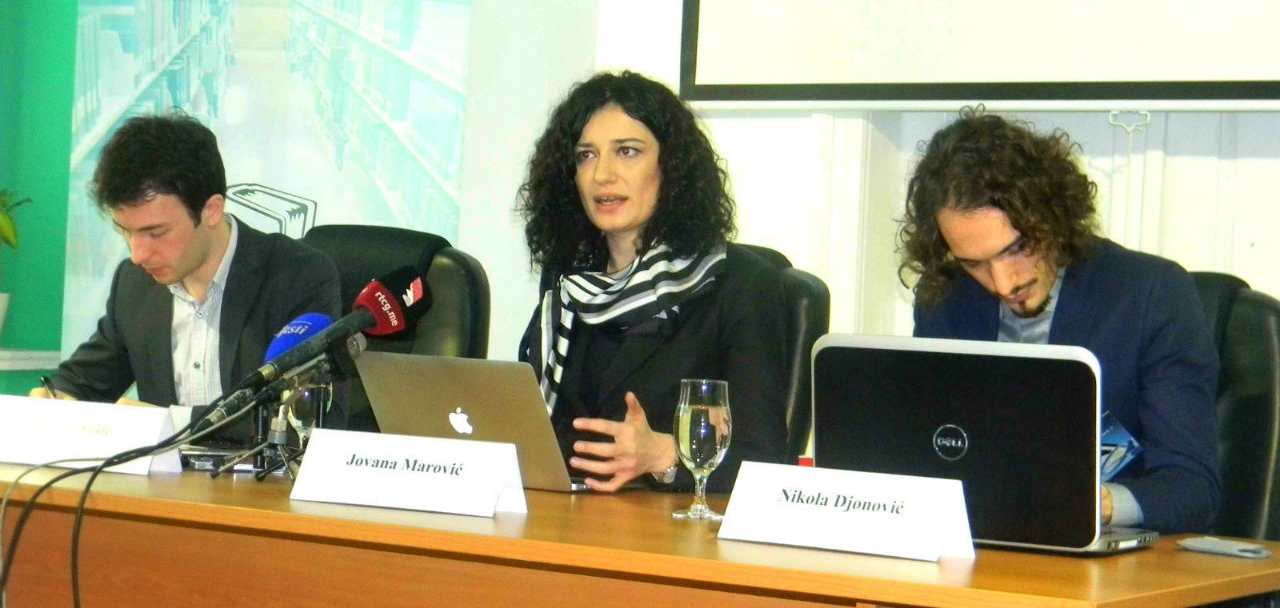The study »Procurement in Montenegrin municipalities« was presented today at the Centre for Civic Education (CCE) by Nikola Đonović (CCE), coordinator of the project “Corruption on the local level – zero tolerance!”, Marko Sošić, researcher of public policies (Institute Alternative) and Jovana Marović, research coordinator (Institute Alternative).
The study is prepared within the project “Corruption on the local level – zero tolerance!”, conducted by Centre for Civic Education (CCE) in cooperation with NGO Institute Alternative (IA) from Podgorica, NGO Bonum from Pljevlja and NGO Nada from Herceg Novi with the support from European Union through EU Delegation in Montenegro (IPA 2011) and co-financing of the Royal Norwegian Embassy.
At the very beginning, Nikola Djonović emphasized that the goal of the project within which the analysis has been produced is strengthening of the anti-corruption policies implementation at the local level, as well as an increase of the awareness of the citizens about the importance of the effective anti-corruption mechanisms and procedures in 14 Montenegrin municipalities (Bar, Budva, Cetinje, Danilovgrad, Herceg Novi, Kolašin, Kotor, Mojkovac, Nikšić, Pljevlja, Plužine, Podgorica, Rožaje i Tivat). He explained that this is one out of six policy studies in the six fields of high risk for corruption.
Marko Sošić presented the methodology applied within the study development. He explained that review of the situation in public procurement in Montenegro, with a special accent on the local level during 2012 and 2013, is based on official reports on work of the competent institutions in charge of the public procurement system, Government’s conclusions, reports on the analytical review of harmonization of legislation with acquis communitaire concerning chapters 5 Public Procurement and 23 Judiciary and Fundamental Rights, as well as reports of the European Commission on progress of Montenegro in 2013, together with numerous interviews with stakeholders.
Jovana Marović emphasized that key challenges in the field of public procurement are related to weak capacities of competent bodies for implementation of legislation. She assessed that monitoring of realization of signed agreements remains a concern. “Capacities of Administration for Inspection Affairs are insufficient for performing monitoring over implementation of agreements on public procurement below 500.000 euro, while weak capacities of the State Audit Institution limit this body to conduct more than one basic audit of local self-governments annually”, stated Marović. Also, she drew attention on the issue of inadequate planning of public procurement. “All units of local self-government that are covered by this research, had significant deviations in relation to the amount of planned and realized public procurement in 2012”, Marović explained.
The speakers reminded that the study indicates that competent institutions, Ministry of Finance and the Public Procurement Office, shall increase transparency of public procurement procedure and decrease the risks of corruption through legal and institutional changes. Additionally, they stated that on the local level, among others, the action plans for the fight against corruption shall be revised by including measures for prevention of corruption in public procurement, as well as making all reports on public procurement available to the public.
The complete study is available on https://media.cgo-cce.org/2014/02/kako-nabavljaju-CG-opstine.pdf while English version can be downloaded on https://media.cgo-cce.org/2014/02/ProcurementinMNEMunicipality.pdf.
Svetlana Pešić, Programme Associate

